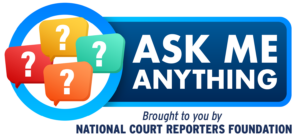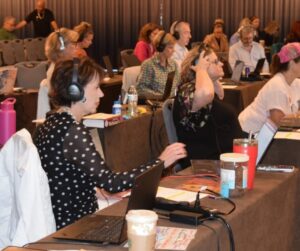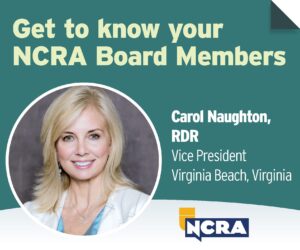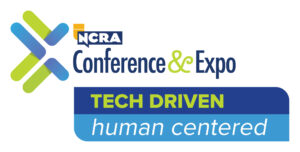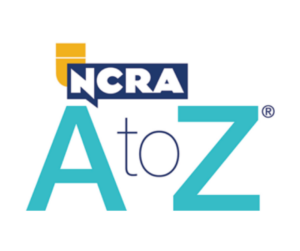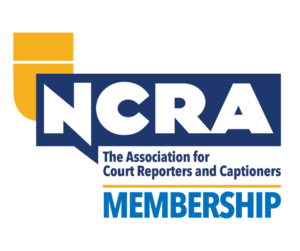By Liane Hatch
If you’d asked me in the spring of 2021 where I saw myself in five years, I’d have told you that I’d expect to be a Sergeant First Class in the U.S. Army by that point, hopefully assigned somewhere cool, hopefully making (literal) headlines as a dedicated, hardworking public affairs NCO. I’d been in the Army since 2016, and I was perfectly happy. Why mess with a good thing?
But if you asked me that same question in the fall of 2021, I’d have laughed. Or cried. Or both. My Army career ended abruptly that summer with an honorable discharge due to family circumstances, and I found myself suddenly moving across the country, suddenly unemployed, and suddenly directionless.
To make a long story short, I ended up enrolled in court reporting school almost on a whim. It looked interesting, but I didn’t know much about it. All I knew was that I needed to enroll in some kind of program ASAP so I could bring in a GI Bill paycheck while I looked for a real job (ha!).
In the four years since, I’ve completed court reporting school and begun my new career as a freelance reporter – an unexpected path that was only made possible to me by my VA (U.S. Department of Veterans Affairs) benefits. And I know we’ve all heard nightmarish stories about the VA; I’ve lived through some of them myself along the way. But armed with a little bit of knowledge, some self-advocacy, and a lot of patience, U.S. military veterans interested in court reporting school can take advantage of some tremendous opportunities, particularly through the Veterans Readiness and Employment (VR&E) program. Here’s what I’ve learned:
Start with VR&E
Everybody knows about the GI Bill, but for eligible veterans, the Veterans Readiness and Employment (VR&E) program can be much more beneficial. Previously known as Vocational Rehabilitation and Employment (or Voc Rehab), this benefit is available for veterans with service-connected disabilities and aims to assist veterans in finding and preparing for suitable employment. Although technically an employment program as opposed to an education program, the VR&E “Employment Through Long-Term Services” track offers up to 48 months of education benefits (more than the GI Bill’s typical 36-month entitlement), covering veterans’ tuition, fees, and supplies and paying a monthly housing allowance for students enrolled ¼ -time or more.
And one of my favorite parts? If you’re eligible for VR&E benefits and Post-9/11 GI Bill benefits and you use VR&E first, none of your VR&E benefits will be deducted from your Post-9/11 GI Bill. That means you can use up to 48 months of education benefits through VR&E and up to 36 months of education benefits with the Post-9/11 GI Bill. Court reporting school timelines can be unpredictable, and it’s nice to know that even if it takes longer than expected, you still have options.
Now, if you started court reporting school using the GI Bill (like I did) and later discover you’re eligible for VR&E, not to worry. The rules are a bit different and the time you used under the GI Bill can be deducted from your VR&E benefit, but you may be eligible to have those GI Bill benefits restored under what’s called “retroactive induction.” This would be a great question for your VR&E employment coordinator.
Benefits Beyond the Classroom
My other favorite thing about the VR&E program is that it doesn’t end when you get your diploma. Employment through Long-Term Services is just one of five “employment tracks” offered through VR&E. Once a veteran has demonstrated their readiness to work – typically by completing school or providing evidence of standing job offers – they become eligible to move to the “Rapid Access to Employment” (RAE) track.
Here’s where the program can REALLY shine: under the RAE track, as long as certain requirements are met, veterans who require specialized equipment to perform their jobs may be provided with those items from the VA. And as we all know, court reporting equipment isn’t cheap. So with proper documentation and review, things like a new writer, professional CAT software, microphones, recording devices, and other necessary startup equipment may be provided to VR&E participants at no cost.
Why? The goal of VR&E, ultimately, is to eliminate barriers to work for veterans with service-connected disabilities. And if we have the education and skills necessary to work as court reporters, but we lack the tools and equipment required to actually perform the job, is that not a barrier to employment?
Additionally, following the completion of the Long-Term Services Track, veterans in the RAE track may be eligible for two additional months of their housing stipend, meant to provide a sort of support buffer while they seek and/or transition to employment.
Something to Consider
“But what about freelancers?” you might ask. I did. I am a freelancer. And although technically freelancers are self-employed, the VR&E program can recognize freelance work as “employment.” Now, to determine eligibility for some of these RAE benefits, the VA may need to see certain forms of documentation from your “employer.” In my case, I presented my vocational counselor with an offer letter from an agency I planned to work with. This letter laid out the conditions of the contractor-agency agreement – one of those conditions being that I must furnish all my own equipment and supplies. In the same letter, the agency owner kindly listed the various types of equipment that I would need in order to successfully perform my contracted duties as a freelance court reporter. That worked, and my request for equipment was approved.
For this reason, I highly recommend students interested in utilizing this program begin developing relationships with local agencies who may be able to help them with this part of the process when the time comes. And the sooner you can make those connections, the better. You can start by attending state and national conferences or other networking events. Ultimately, what you don’t want is to come to the end of your time in school, be ready to start working, and have no idea of how to actually get work.
A word of caution, however: don’t expect this process to move fast. This IS still the VA we’re talking about, after all. If you’re going to try to use the VR&E program to acquire your startup equipment, please, please, please work closely with your employment counselor. Communicate your intentions and your expectations. Let them know right off the bat that this purchase will very likely be larger than other RAE purchases they’ve facilitated before. And know the regulations; the Veteran Readiness & Employment Manual is a document called “M28C.” You can find more information about entitlement for equipment purchases under M28C.V.A.3, specifically in section 3.02 c.
Personally, my equipment acquisition process was kind of a disaster. It still happened eventually, but it was a long and arduous process. My hope is that I can help make it easier for the next person by sharing my own experience.
Know the Process and Come Prepared
Veterans Readiness & Employment is a much more robust program than the GI Bill, but that also means there are many more hoops to jump through before you can begin. If you’re interested in applying VR&E benefits to a court reporting program, fantastic! It’s absolutely possible. However, you do need to plan ahead and prepare to make a case for yourself.
To apply for VR&E benefits, Step 1 is simple: apply online.
Step 2: After you apply, the VA will schedule a meeting with a vocational rehabilitation counselor (VRC) to determine whether you have an employment handicap resulting from your service-connected disability/disabilities and whether you’re entitled to benefits and services.
Here’s where you advocate for yourself and make your “sell,” so to speak. You’ll tell them what your service-connected disabilities are, explain how they make it difficult for you to gain employment and/or what challenges they present in your current employment, and then you’ll explain why court reporting is a viable and suitable career option.
You need to make the case to your VRC that court reporting is a thriving career and that it will not exacerbate or be impeded by your service-connected disabilities. If you’re missing three fingers, for example, you may have a tough time convincing your VRC that machine steno is the job choice for you. But if your service-connected disability pertains to, say, a knee injury and your current job requires you to stand all day, great – it totally makes sense why the switch to court reporting might be a good choice.
Be prepared to talk about other job fields you may already have training and experience in and why those paths are no longer working for you. Speaking from my own experience, at the time of my initial meeting with my VRC, I was rated at 30 percent for an anxiety disorder. I was able to successfully argue that my anxiety made it difficult for me to work in journalism despite my degree in journalism and my experience as a public affairs NCO, and that freelance work would allow me the flexibility to work more on my own terms.
YouTube has plenty of videos with excellent advice about what to expect and how to prepare for these meetings. The r/VeteransBenefits subreddit is also a tremendous resource. The most important thing here is to come prepared to explain why this makes sense for you. Do your homework and know why you want to be a court reporter.
Step 3: If you’re determined to be entitled to VR&E benefits and services, you’ll meet again with your VRC, this time to develop a rehabilitation plan. During that meeting, talk to your counselor about your expectations for school and your plans for work once school is over. Let them know that you’ll need specialized equipment before you’re able to work and ask what’s the best way to approach that when the time comes.
Limitations
Today, most court reporting training and education happens online. However, not every court reporting program will be eligible for VR&E or GI Bill benefits. Check the GI Bill Comparison Tool to determine if the program you’re interested in is eligible. Many of the NCRA-Approved Court Reporting Programs do meet eligibility criteria, but if you’re looking to learn a specific theory or work with a certain instructor, that may limit your ability to use VR&E or GI Bill benefits to fund your court reporting education. That said, if you’ve already completed a court reporting program but have not yet started working, or you’re near the end of one and don’t need the VA to pay for schooling, you can always see about enrolling in the Rapid Access to Employment track from the start. I can’t vouch for how well that would work because it’s outside my own experience, but it’s worth asking your counselor.
GI Bill
If you are ineligible for VR&E benefits for whatever reason, the Post-9/11 GI Bill is still an incredible benefit. Your GI Bill benefits can cover the cost of tuition, fees, and school supplies (to include a student writer and software), and you can receive housing allowance if you’re enrolled at least half-time in an approved program. Eligibility for the GI Bill will depend on the nature of your military discharge and the length of time you spent on active duty. In most cases, veterans are entitled to 36 months of GI Bill benefits, but in some cases, they may be eligible for up to 48 months. And, if you’re ineligible for VR&E benefits when you begin court reporting school and you start out using GI Bill benefits, it’s absolutely possible to switch to VR&E later if you do become eligible. That’s what I did!
Final Thoughts
- If you want to explore VR&E as an option, do your homework. There are so many resources on YouTube and Reddit to help you prepare for your first eligibility meeting with your VRC. But you are the expert on your own conditions, limitations, and goals, so don’t just copy and paste from someone else’s experience.
- Keep your counselor updated on your progress and your goals. Ask them questions. Explain how court reporting school is different from more traditional programs, and ask for their recommendations on how to get the most out of your benefits considering the unique needs of this profession.
- Feel free to reach out. I am NOT an expert, not a veterans service officer, not a VA employee. However, I navigated court reporting school with both the GI Bill and VR&E, and I’m happy to share advice from my own experience. Feel free to contact me at lianehatch@pm.me with any questions.
Liane Hatch is a freelance reporter from Whispering Pines, N.C. She can be reached at lianehatch@pm.me


